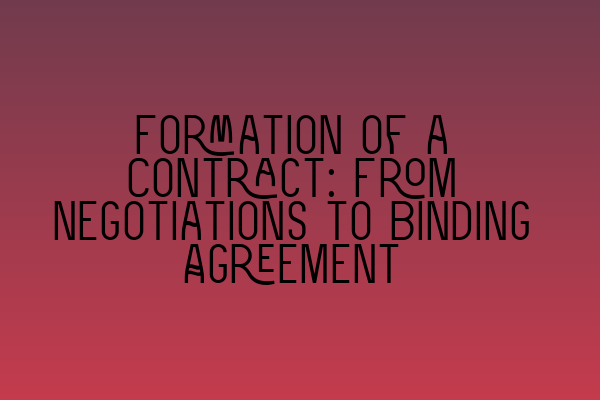Formation of a Contract: From Negotiations to Binding Agreement
Contracts are the foundation of business agreements, ensuring that all parties involved are legally bound to fulfill their obligations. Understanding how contracts are formed is essential for lawyers, business professionals, and anyone involved in negotiations. In this article, we will explore the process of contract formation, from initial negotiations to the creation of a legally binding agreement.
Negotiations and Offer
The first step in contract formation is negotiations between the parties involved. During this stage, parties exchange ideas, discuss terms, and determine the scope of their agreement. It is crucial to clearly articulate the intentions and terms of the proposed agreement to avoid any misunderstandings.
An offer is a proposal made by one party to another, indicating a willingness to enter into a contract on specific terms. The offer must be communicated to the recipient, and it can be made verbally, in writing, or even by conduct. It is important to note that an offer may be accepted, rejected, or countered by the other party.
For a valid offer, certain elements must be present. These include a clear intention to create legal relations, certainty of terms, and communication of the offer to the offeree. Additionally, the offer must be made with the intention that it will become binding upon acceptance.
To better understand the legal aspects of contract formation, you can check out our article on SQE 1 Practice Exam Questions.
Acceptance and Consideration
Once an offer has been made, the offeree has the option to accept, reject, or counter the offer. For a contract to be formed, there must be an unequivocal acceptance of the offer. This means that the offeree must accept all the terms of the offer without introducing new or different terms.
An acceptance takes effect when it is communicated to the offeror. It can be communicated orally, in writing, or through conduct. It is important to note that silence or inaction usually cannot be considered as acceptance, unless there is a prior agreement or course of dealing between the parties.
In addition to acceptance, a valid contract requires consideration. Consideration is something of value exchanged between the parties, such as money, goods, or services. It is a mutual exchange that demonstrates each party’s intention to be bound by the contract. Consideration must have some value, even if it is minimal, and cannot be merely a promise to do something.
To learn more about contract law, you can explore our article on SQE 1 Practice Mocks FLK1 FLK2.
Intention to Create Legal Relations and Certainty of Terms
For a contract to be enforceable, there must be an intention to create legal relations between the parties. This means that both parties must intend for their agreement to have legal consequences. In commercial agreements, it is generally presumed that the parties intended to create a legally binding contract.
Furthermore, a contract must have certainty of terms. This means that the terms of the agreement must be clear, specific, and capable of being understood. Uncertainty or vagueness in the terms can render the contract unenforceable.
If you are preparing for the SQE exams, make sure to check out our comprehensive SQE 2 Preparation Courses to enhance your knowledge in contract law.
Conclusion
Understanding the process of contract formation is essential in ensuring that agreements are legally binding and enforceable. From negotiations and offers to acceptance and consideration, each step plays a crucial role in creating a valid and binding contract.
If you are interested in furthering your understanding of contract law and preparing for the SQE exams, we recommend exploring our SQE 1 Preparation Courses. These courses are designed to equip you with the knowledge and skills necessary to excel in your legal career.
Stay informed about the latest SRA SQE Exam Dates and take your legal expertise to new heights!
